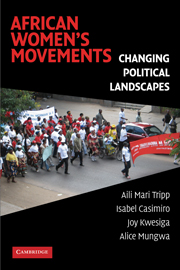The steady end to a significant number of conflicts in Africa since the mid-1980s has been an important change in the African political landscape. Sometimes low-grade conflict continued in the aftermath of a negotiated peace agreement. Major settlements occurred after the end of national wars of liberation in Namibia and South Africa. Civil conflicts diminished or came to an end in countries such as Angola (2002), Burundi (2004), Chad, (2002), the Democratic Republic of Congo (2002), Liberia (2003), Mozambique (1992), Rwanda (1994), Sierra Leone (2002), southern Sudan (2005), and northern Uganda (2007).
With the winding down of almost all these major conflicts, women's organizations vigorously pressed for increased political representation and changes in policy and legislation regarding women's rights. Unlike the post-conflict situations prior to the 1990s, and especially after 2000, women now were beginning to see many of their aspirations for greater rights addressed through new constitutions and the passage of legislation. International norms were changing, as evident in governmental commitments made at the 1995 Beijing United Nations Conference on Women and in other international and regional treaties and conventions.
One of the clearest examples of this change is in the area of women's legislative representation. In African countries where conflicts ended after 1985, women hold, on average, 24 percent of legislative seats compared with countries that did not experience conflict, where women account for only 13 percent of the legislative seats.
